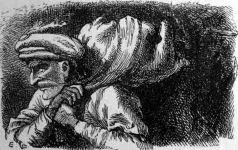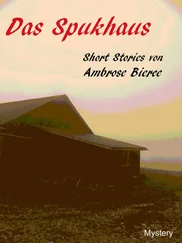Ambrose Bierce - Cobwebs from an Empty Skull
Здесь есть возможность читать онлайн «Ambrose Bierce - Cobwebs from an Empty Skull» весь текст электронной книги совершенно бесплатно (целиком полную версию без сокращений). В некоторых случаях можно слушать аудио, скачать через торрент в формате fb2 и присутствует краткое содержание. Жанр: Юмористическая проза, Классическая проза, на английском языке. Описание произведения, (предисловие) а так же отзывы посетителей доступны на портале библиотеки ЛибКат.
- Название:Cobwebs from an Empty Skull
- Автор:
- Жанр:
- Год:неизвестен
- ISBN:нет данных
- Рейтинг книги:4 / 5. Голосов: 1
-
Избранное:Добавить в избранное
- Отзывы:
-
Ваша оценка:
- 80
- 1
- 2
- 3
- 4
- 5
Cobwebs from an Empty Skull: краткое содержание, описание и аннотация
Предлагаем к чтению аннотацию, описание, краткое содержание или предисловие (зависит от того, что написал сам автор книги «Cobwebs from an Empty Skull»). Если вы не нашли необходимую информацию о книге — напишите в комментариях, мы постараемся отыскать её.
Cobwebs from an Empty Skull — читать онлайн бесплатно полную книгу (весь текст) целиком
Ниже представлен текст книги, разбитый по страницам. Система сохранения места последней прочитанной страницы, позволяет с удобством читать онлайн бесплатно книгу «Cobwebs from an Empty Skull», без необходимости каждый раз заново искать на чём Вы остановились. Поставьте закладку, и сможете в любой момент перейти на страницу, на которой закончили чтение.
Интервал:
Закладка:

A man staggering wearily through the streets of Persepolis, under a heavy burden, said to himself:
"I wish I knew what this thing is I have on my back; then I could make some sort of conjecture as to what I design doing with it."
"Suppose," said the burden, "I were a man in a sack; what disposition would you make of me?"
"The regular thing," replied the man, "would be to take you over to Constantinople, and pitch you into the Bosphorus; but I should probably content myself with laying you down and jumping on you, as being more agreeable to my feelings, and quite as efficacious."
"But suppose," continued the burden, "I were a shoulder of beef-which I quite as much resemble-belonging to some poor family?"
"In that case," replied the man, promptly, "I should carry you to my larder, my good fellow."
"But if I were a sack of gold, do you think you would find me very onerous?" said the burden.
"A great deal would depend," was the answer, "upon whom you happened to belong to; but I may say, generally, that gold upon the shoulders is wonderfully light, considering the weight of it."
"Behold," said the burden, "the folly of mankind: they cannot perceive that the quality of the burdens of life is a matter of no importance. The question of pounds and ounces is the only consideration of any real weight."
LVII.
A ghost meeting a genie, one wintry night, said to him:
"Extremely harassing weather, friend. Wish I had some teeth to chatter!"
"You do not need them," said the other; "you can always chatter those of other people, by merely showing yourself. For my part, I should be content with some light employment: would erect a cheap palace, transport a light-weight princess, threaten a small cripple-or jobs of that kind. What are the prospects of the fool crop?"
"For the next few thousand years, very good. There is a sort of thing called Literature coming in shortly, and it will make our fortune. But it will be very bad for History. Curse this phantom apparel! The more I gather it about me the colder I get."
"When Literature has made our fortune," sneered the genie, "I presume you will purchase material clothing."
"And you," retorted the ghost, "will be able to advertise for permanent employment at a fixed salary."
This fable shows the difference between the super natural and the natural "super": the one appears in the narrative, the other does not.
LVIII.
"Permit me to help you on in the world, sir," said a boy to a travelling tortoise, placing a glowing coal upon the animal's back.
"Thank you," replied the unconscious beast; "I alone am responsible for the time of my arrival, and I alone will determine the degree of celerity required. The gait I am going will enable me to keep all my present appointments."
A genial warmth began about this time to pervade his upper crust, and a moment after he was dashing away at a pace comparatively tremendous.
"How about those engagements?" sneered the grinning urchin.
"I've recollected another one," was the hasty reply.
LIX.
Having fastened his gaze upon a sparrow, a rattlesnake sprung open his spanning jaws, and invited her to enter.
"I should be most happy," said the bird, not daring to betray her helpless condition, but anxious by any subterfuge to get the serpent to remove his fascinating regard, "but I am lost in contemplation of yonder green sunset, from which I am unable to look away for more than a minute. I shall turn to it presently."
"Do, by all means," said the serpent, with a touch of irony in his voice. "There is nothing so improving as a good, square, green sunset."
"Did you happen to observe that man standing behind you with a club?" continued the sparrow. "Handsome fellow! Fifteen cubits high, with seven heads, and very singularly attired; quite a spectacle in his way."
"I don't seem to care much for men," said the snake. "Every way inferior to serpents-except in malice."
"But he is accompanied by a really interesting child," persisted the bird, desperately.
The rattlesnake reflected deeply. He soliloquized as follows:
"There is a mere chance-say about one chance to ten thousand million-that this songster is speaking the truth. One chance in ten thousand million of seeing a really interesting child is worth the sacrifice demanded; I'll make it."
So saying, he removed his glittering eyes from the bird (who immediately took wing) and looked behind him. It is needless to say there was no really interesting child there-nor anywhere else.
MORAL.-Mendacity (so called from the inventors) is a very poor sort of dacity; but it will serve your purpose if you draw it sufficiently strong.
LX.
A man who was very much annoyed by the incursions of a lean ass belonging to his neighbour, resolved to compass the destruction of the invader.
"Now," said he, "if this animal shall choose to starve himself to death in the midst of plenty, the law will not hold me guilty of his blood. I have read of a trick which I think will 'fix' him."
So he took two bales of his best hay, and placed them in a distant field, about forty cubits apart. By means of a little salt he then enticed the ass in, and coaxed him between the bundles.
"There, fiend!" said he, with a diabolic grin, as he walked away delighted with the success of his stratagem, "now hesitate which bundle of hay to attack first, until you starve-monster!"
Some weeks afterwards he returned with a wagon to convey back the bundles of hay. There wasn't any hay, but the wagon was useful for returning to his owner that unfortunate ass-who was too fat to walk.
This ought to show any one the folly of relying upon the teaching of obscure and inferior authors. [B] [B] It is to be wished our author had not laid himself open to the imputation of having perverted, if not actually invented, some of his facts, for the unworthy purpose of bringing a deserving rival into disfavour.-TRANSLATOR.
LXI.
One day the king of the wrens held his court for the trial of a bear, who was at large upon his own recognizance. Being summoned to appear, the animal came with great humility into the royal presence.
"What have you to say, sir," demanded the king, "in defence of your inexcusable conduct in pillaging the nests of our loyal subjects wherever you can find them?"
"May it please your Majesty," replied the prisoner, with a reverential gesture, repeated at intervals, and each time at a less distance from the royal person, "I will not wound your Majesty's sensibilities by pleading a love of eggs; I will humbly confess my course of crime, warn your Majesty of its probable continuance, and beg your Majesty's gracious permission to inquire-What is your Majesty going to do about it?"
The king and his ministers were very much struck with this respectful speech, with the ingenuity of the final inquiry, and with the bear's paw. It was the paw, however, which made the most lasting impression.
Always give ear to the flattery of your powerful inferiors: it will cheer you in your decline.
LXII.
A philosopher looking up from the pages of the Zend-Avesta, upon which he had been centring his soul, beheld a pig violently assailing a cauldron of cold slops.
"Heaven bless us!" said the sage; "for unalloyed delight give me a good honest article of Sensuality. So soon as my 'Essay upon the Correlation of Mind-forces' shall have brought me fame and fortune, I hope to abjure the higher faculties, devoting the remainder of my life to the cultivation of the propensities."
Читать дальшеИнтервал:
Закладка:
Похожие книги на «Cobwebs from an Empty Skull»
Представляем Вашему вниманию похожие книги на «Cobwebs from an Empty Skull» списком для выбора. Мы отобрали схожую по названию и смыслу литературу в надежде предоставить читателям больше вариантов отыскать новые, интересные, ещё непрочитанные произведения.
Обсуждение, отзывы о книге «Cobwebs from an Empty Skull» и просто собственные мнения читателей. Оставьте ваши комментарии, напишите, что Вы думаете о произведении, его смысле или главных героях. Укажите что конкретно понравилось, а что нет, и почему Вы так считаете.





